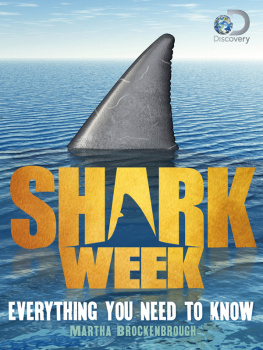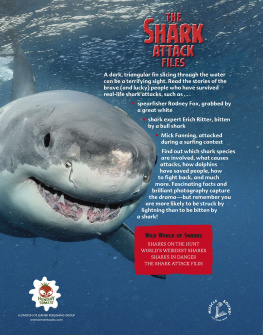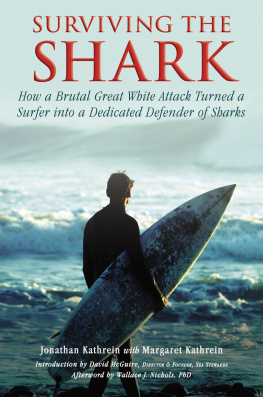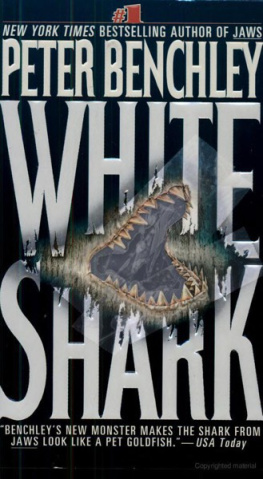Michael Capuzzo - Close to Shore: The Terrifying Shark Attacks of 1916
Here you can read online Michael Capuzzo - Close to Shore: The Terrifying Shark Attacks of 1916 full text of the book (entire story) in english for free. Download pdf and epub, get meaning, cover and reviews about this ebook. year: 2002, publisher: Broadway Books, genre: Non-fiction. Description of the work, (preface) as well as reviews are available. Best literature library LitArk.com created for fans of good reading and offers a wide selection of genres:
Romance novel
Science fiction
Adventure
Detective
Science
History
Home and family
Prose
Art
Politics
Computer
Non-fiction
Religion
Business
Children
Humor
Choose a favorite category and find really read worthwhile books. Enjoy immersion in the world of imagination, feel the emotions of the characters or learn something new for yourself, make an fascinating discovery.

- Book:Close to Shore: The Terrifying Shark Attacks of 1916
- Author:
- Publisher:Broadway Books
- Genre:
- Year:2002
- Rating:4 / 5
- Favourites:Add to favourites
- Your mark:
- 80
- 1
- 2
- 3
- 4
- 5
Close to Shore: The Terrifying Shark Attacks of 1916: summary, description and annotation
We offer to read an annotation, description, summary or preface (depends on what the author of the book "Close to Shore: The Terrifying Shark Attacks of 1916" wrote himself). If you haven't found the necessary information about the book — write in the comments, we will try to find it.
Michael Capuzzo: author's other books
Who wrote Close to Shore: The Terrifying Shark Attacks of 1916? Find out the surname, the name of the author of the book and a list of all author's works by series.
Close to Shore: The Terrifying Shark Attacks of 1916 — read online for free the complete book (whole text) full work
Below is the text of the book, divided by pages. System saving the place of the last page read, allows you to conveniently read the book "Close to Shore: The Terrifying Shark Attacks of 1916" online for free, without having to search again every time where you left off. Put a bookmark, and you can go to the page where you finished reading at any time.
Font size:
Interval:
Bookmark:

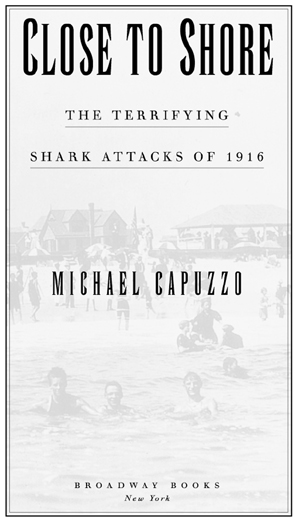
Contents
PART ONE
AN ERRATIC ERA
PART TWO
A REIGN OF TERROR
PART THREE
TO DESTROY NO MORE
To my father, William, who was born in the time of the shark and died while I was writing this story; my wife, Teresa, first ever in my heart, who turned the nightmares of predators into dreams; and finally Cosmo, a beagle, who sat on my lap all during the writing, watching for prey moving in the fields.
The beach was such a novel experience that most were completely unfamiliar with the health hazardsand risks to life and limbit posed.
Gideon Bosker and Lena Lencek,
The Beach: The History of Paradise on Earth
We're not just afraid of predators, we're transfixed by them, prone to weave stories and fables and chatter endlessly about them, because fascination creates preparedness, and preparedness, survival. In a deeply tribal sense, we love our monsters.
E. O. Wilson
Author's Note
T his is a work of nonfiction. All characters are real, and their descriptions, actions and dialogue are based on newspaper accounts, interviews with family members, diaries, medical journals, and other historic sources. All of the shark attacks occurred as described in numerous contemporary newspaper accounts and interviews. To reconstruct the life of a shark in 1916 presented unique challenges. Its movements and the reasons for its unprecedented attacks have baffled scientists for nearly a century, and the mystery endures. I have given the most realistic and thorough account possible of the shark's actions based on the best available science, including interviews with ichthyologists and a study of current scientific literature. I have tried to make the individuals who play a role in this story come to life through the use of numerous historical and contemporary sources, and none utters a word, to the best of my knowledge, that he or she did not say. In rare and minor cases where the facts could not be discovered, for instance, whether a man took a hansom or automobile, I have used the same technique applied to the sharkto portray the most likely event based on extensive research of the time, place, and character. These few instances do not affect what I intended to be the most thorough and realistic account of the shark and the people and society it changed in 1916.
Michael Capuzzo
Wenonah, New Jersey
March 1, 2001
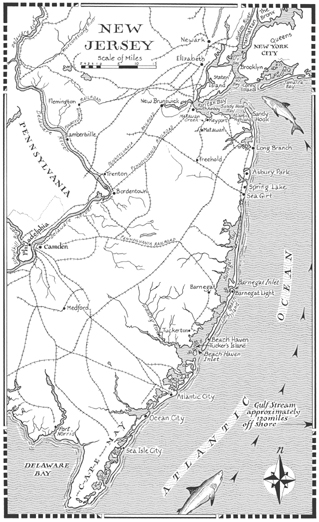
The Last Man in the Water
The smell of the sea pulled him east. The Atlantic spread before him like a pool of diamonds, liquefied, tossing gently in gleaming tips and shards of changeable, fading bronze light. The sun climbed down toward dusk behind mountains of clouds swollen with moisture. The young man couldn't wait to get in the water.
The sandy beach stretched for miles. Behind him were sea-grass-covered dunes, bleached fragments of shipwrecks, the shadows of Victorian turrets facing the sea. The warm wind carried the bark of a retriever, the faint perfume, so close, of the young women watching from the sands in their hourglass Gibson Girl dresses, their hair swept up high like the clouds captured in silk bow-tie ribbons. He was a handsome young man with slicked-back dark hair, a strong profile, a man who drew notice. He moved with the slight elbows-out jauntiness of a rebel, for ocean swimming was a new and godless pursuit, a worship of the cult of the body. The startling vision of a young man at the edge of the sea, Thomas Mann had recently written, conjured up mythologies, was like a primeval legend, handed down from the beginning of time, of the birth of form, of the origin of the Gods.
As the young man paused to survey the beach, the dog came beside him and lapped his hand. The man put his toes in the water, then strode quickly into the shallows, the sandy muck sucking at his feet, for there could be no hesitation, no sign of timidity. Timidity was something he was determined to leave far behind, once and forever. The temperature of the water was sixty-eight degrees Fahrenheit, but he walked out thigh-deep, giving the impression it was a stroll in the afternoon air. As the water reached for his torso, he jackknifed his body and dove in. The lifesavers' rowboat, an old shore-whalers model, lay up on dry sand, beyond the seaweed line.
There were a few other swimmers, splashing and floundering near shore. Quickly, he was beyond them. He was strong and practiced, with a lean, muscular body, and he moved swiftly into deeper water. In the far distance, merchant steamers crawled northward on the warm, onrushing torrents of the Gulf Stream. He could hear splashing behind him, the dog playfully following. All eyes, he knew, were on him now.
He had tried out for the swim team at the university and failed to make it, but he was in his early twenties, at the cusp of manhood, and his endurance did not wane. Soon he had the water to himself, it was his ocean, he was without doubt the strongest swimmer of the hour, and he stopped, exhaled, and floated on his back, a signal to shore that he had done what he had set out to do. He couldn't have known precisely how deep the water was beneath him, but, considering his distance from shore, he was certainly in far over his head.
It is impossible to know what the young man was thinking as he floated, and the moments passed lazily into twilight. Perhaps he was thinking that he had come to a place of greatest ease, safety, and comfort. The whole summer stretched before him on the beach, with family and friends, not a care in the world but the European war across the pond, which touched him not. His father had removed him from the mysterious and deadly plagues afflicting the lower classes in Philadelphia. He was engaged to be married in the fall. Perhaps he was pining over his absent love, his first and forever love, as a young man does under a summer sky with all of life ahead. The wedding was arranged. His whole future had been wonderfully arranged.
After a time, he realized he no longer heard the splashing of the dog. He turned over on his stomach and looked toward land: the beach was a distant, shimmering strip exhaling the day's radiant heat; the shadows had deepened in front of the turrets; ladies' parasols on the boardwalk bobbed like puffs of yellow cream against the darkening sky. He was the last man in the water. He heard the dog barking from somewhere, across the wind and waves, and was amused. He heard voices, as if from far away. He kicked vigorously, and began his crawl toward shore. He felt an exhilarating jolt of adrenaline lifting him onward and over the waves. Perhaps he mistook it for the thrill of being noticed, or a simple joy in his youth and strengthHe is a Mercury, a brown Mercury, his heels are winged, and in them is the swiftness of the sea, Jack London, one of his favorite authors, had written.
His form was perfect, arms arcing through the sea.

The Hotel
Font size:
Interval:
Bookmark:
Similar books «Close to Shore: The Terrifying Shark Attacks of 1916»
Look at similar books to Close to Shore: The Terrifying Shark Attacks of 1916. We have selected literature similar in name and meaning in the hope of providing readers with more options to find new, interesting, not yet read works.
Discussion, reviews of the book Close to Shore: The Terrifying Shark Attacks of 1916 and just readers' own opinions. Leave your comments, write what you think about the work, its meaning or the main characters. Specify what exactly you liked and what you didn't like, and why you think so.

